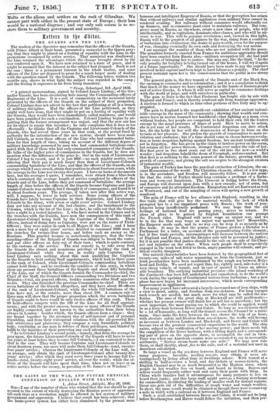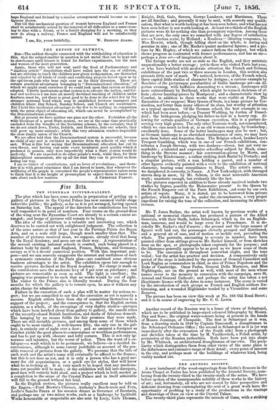THE GAINS OF THE WAR, AND FUTURE PHYSICAL CONNEXION OF
ENGLAND WITH FRANCE.
1, Adam Street, Adelphi, May 26, 1856. Siai—I am of the number of those who wished that the war should be pro- secuted to the extant of wholly destroying the Russian power of aggression till such time as a revolution might be effected in her system of military government and oppression. I believe that result has been achieved ; that the brute-power system has either been abandoned by the present more humane and intelligent Emperor of Russia, or that the perception has arisen that without railways and similar appliances even military force cannot be rendered availing. But railways without commerce would effectually eat up finances, and so commerce must exist to maintain railways. But com- merce must in Russia, as elsewhere, create a new class of people who will intellectually, and as capitalists, dominate other classes, and who will be ad- verse to war. This will be genuine revolution ; and, viewed in this light, Russia will be the greatest of all gainers by the war, rising from a condition of barbarism into civilization ; the desire to gain wealth, even for the purpose of war, changing eventually its own ends and destroying the war mania.
I am amongst the number of those who are not satisfied with the peace. The penalties formerly exacted from France for ambitious aggression should have been exacted from Russia also,—military occupation till she had paid all the costs of bringing her to justice. She may say, like the thief, " As the only penalty for burglary is being turned out of the house, I will try it again at a future opportunity." She should have been made to pay the expenses involved in her capture and been kept to hard labour as a penalty. The chief present restraint upon her is the consciousness that the public is too strong for her.
The general gain is, the free transit of the Danube and of the Black Sea, the opening to commerce and to colonization ; and it is a consolation to think that much of the money we have expended is in the hands of Eastern people and of active Greeks, to whom it will serve BB capital to commence dealings with the world at large, and with ourselves in particular.
The gain to Italy is the fact that Piedmont has fought side by side with England and France, and is thereby rendered safe from Austrian aggression. A nucleus is formed to which in time other portions of free Italy may be ag- gregated.
The gain to England is the magnificent exhibition of her ancient indomi- table courage in the mass of the community ,• showing that wealth and com- merce have in nowise lessened her hardihood—that fighting as a mass, even without leaders, her people are competent to hold their own till the leaders emerge by the usual processes of times of peril. Slow to move to action, she 1s yet sure of her results. No Continental despotism can dare attack her, for she holds in her will the democracies of Europe to loose on the tyrants at her pleasure. She prefers the growth of communities to mere re- volution and confusion ' • but if a time should come to choose between revolu- tion or brute despotism fighting against freedom, her ancient traditions will not be forgotten. She has given up the claim to lawless power on the ocean, but retains all her power thereon, stronger than ever under the rule of law. Her fleet grew in two short years out of the old into the new—a world's wonder ; and despotism beheld the doom of Cronstadt, and succumbed. But that fleet is as nothing to the ocean powers of the future, growing with the growth of commerce and giving the salt sea sceptre to the strongest creators of industrial wealth.
The gain of Turkey has been the practical extinction of Islamism, the an. cient Mormonism of the world. The Christian element, albeit of a low type; is in the ascendant, and freedom will assuredly follow. It is not possi- ble that the ruler of Turkey should long continue a .professor of a barba- rous roue and worn-out fanaticism. The Crescent is fading before the Cross, and Europe will descend upon Asia with a new crusade, not of arms, but of commerce and its attendanareedom. Emigration will set Eastward as well as Westward, and out of the mingling of races will spring a new growth of manhood. The gain of France will be her alliance with England, resulting in the free trade that will give her the material wealth, the lack of Whicli prompted her to a too impatient peace with Russia; the work of pun- ishment being insufficiently performed. We may hope that the old feelings of national feud are passing away, never to return. No ideas of glory to be gained by English humiliation can prompt the French ruler. England will never wage an unjust war, and WO be to the foe that may wage an unjust war against her ! Meanwhile, the Emperor needs cash, and in no way can he reap it so securely as by free trade. It may be that the genius of France prefers a Dictator to a Parliament for a ruler, on account of the preponderating Celtic element ; but if free trade prevails, intermarriages will increase between the natives of England and France, and the Dictator rule will be governed by justice ; for it is not possible that justice should be the rule on one side of the Chan- nel and injustice on the other. When each people shall be respectively engaged in the work best fitted to them, angry passions will subside, and po- litical cruelty disappear. Our natural characteristics have been fostered by the geographical fact of twenty-one miles of salt water separating us from the Continent, just as Irish peculiarities have been maintained by the rough sea between Holy- head head and Dublin. We need not regret this, for, rightly used, salt- ater is a very cheap vehicle of transit, and in case of quarrel it forms an adtnir- able boundary. The outlying industrial province—the island workshop of the Continent—has been left undisturbed and unmolested, to do the world's work during the uprising of Continental nations from barbarism ; but a new phase has now begun for increased intercourse, which needs corresponding improvement in appliances.
For many years I have advocated a largely-increased use of iron ships, with a view to speed, safety, and freedom from sea-sickness. For long voyages such vessels are needed, but much more for what may be called the sea-
ferries. The uses of the great ship at Blackwell are still problematic—
whether her present owners will finish her or sell her is uncertain; but the most important, the most paying use to which she could be applied, would be as a ferry-boat between Dover and Calais. So long as see-sickness shall be a lot of humanity, so long will the transit across the Channel be a mini- mum. Once make the ferry between the two shores the trip of an hour, with absolute safety and freedom from sea-sickness, the traffic will become as incessant as between London and Blackwell, and Dover and Calais will become two of the greatest commercial emporiums in the world. The ship exists, subject to the verification of her moving power ; and there needs but the completion of the Dover harbour, with a fitting depth and a correspond- ing pair of piers on the opposite shore, to accomplish the end in view.
Time was when our American cousins were accustomed to say in mercantile arithmetic, "Sixteen steam-boats make one mile." We may now rate them,. or shall shortly, about five to the mile, and of a material not used in American calculation.
So large a vessel on the sea-ferry between England and France will serve many purposes. Invalids, needing sea-air, may obtain it more ad- vantageously by living afloat than in dwellings ashore. With transit at a shilling to half-a-crown a head, and day-tickets or season-tickets, the English Channel may be as much frequented as the Hudson river, where people in hot weather live on board, and board in living. Buyers and sellers would frequently rather wait and carry their goods with them. In China whole families find it advantageous for many purposes to live on board their ,junks; and this large craft might serveas a floating storehouse for commodities, facilitating the loading of smaller craft for distant regions. Great size gets rid of the difficulties of rough water and rough weather, In short, the same result would be obtained as though there were a causeway smile in width with a railroad on it between England and France.
Such a craft established between Dover and Calais, it would not be long before Southampton and Havre would follow the initiation, and then per- lisps England and Ireland by a similar arrangement would become as con- tiguous shores. But till this mechanical question of transit between England and France shall be satisfactorily solved by the removal of all difficulties to a mere cross- ing to dine with a friend, or to a family shopping for a morning, as they now do along a railway, France and 'England will not be satisfactorily united.



































 Previous page
Previous page